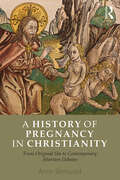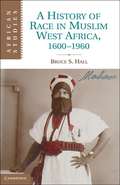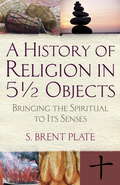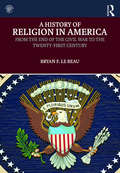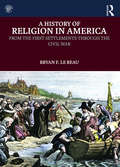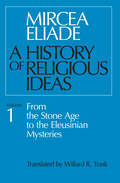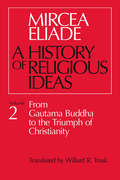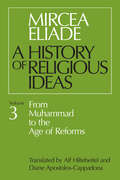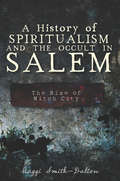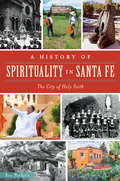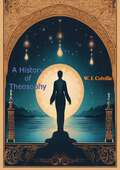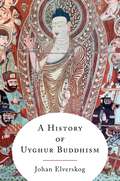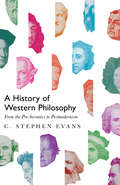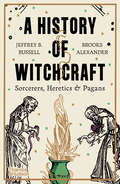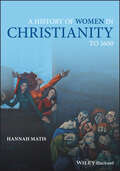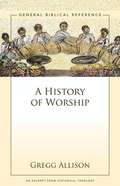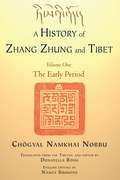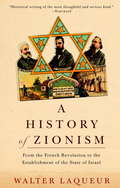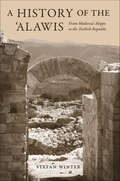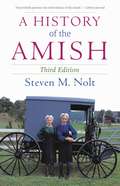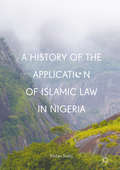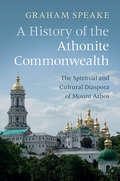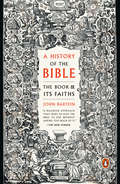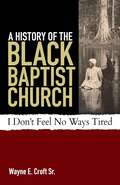- Table View
- List View
A History of Pregnancy in Christianity: From Original Sin to Contemporary Abortion Debates
by Anne StensvoldThis book examines changing views of procreation and fetal development throughout the history of the Christian tradition. This is the first comprehensive study of cultural perceptions of pregnancy, an area of scholarship that been understudied in the past. Pregnancy holds a central place in Christian ritual, iconography, and theology, including the dogma of the incarnation and the cult of Virgin Mary. This book provides a broad introduction to the attitudes and ideas within Western Christian communities by focusing on four periods of transition: Antiquity, the Enlightenment, modernity, and the present day. It lays the groundwork for further study of the interactions between biological models, cultural preconceptions, and religious beliefs.
A History of Race in Muslim West Africa, 1600–1960
by Bruce S. HallThe mobilization of local ideas about racial difference has been important in generating, and intensifying, civil wars that have occurred since the end of colonial rule in all of the countries that straddle the southern edge of the Sahara Desert. From Sudan to Mauritania, the racial categories deployed in contemporary conflicts often hearken back to an older history in which blackness could be equated with slavery and non-blackness with predatory and uncivilized banditry. This book traces the development of arguments about race over a period of more than 350 years in one important place along the southern edge of the Sahara Desert: the Niger Bend in northern Mali. Using Arabic documents held in Timbuktu, as well as local colonial sources in French and oral interviews, Bruce S. Hall reconstructs an African intellectual history of race that long predated colonial conquest, and which has continued to orient inter-African relations ever since.
A History of Religion in 5½ Objects
by S. Brent PlateA leading scholar explores the importance of physical objects and sensory experience in the practice of religion. Humans are needy. We need things: objects, keepsakes, stuff, tokens, knickknacks, bits and pieces, junk, and treasure. We carry special objects in our pockets and purses, and place them on shelves in our homes and offices. As commonplace as these objects are, they can also be extraordinary, as they allow us to connect with the world beyond our skin. A History of Religion in 5½ Objects takes a fresh and much-needed approach to the study of that contentious yet vital area of human culture: religion. Arguing that religion must be understood in the first instance as deriving from rudimentary human experiences, from lived, embodied practices, S. Brent Plate asks us to put aside, for the moment, questions of belief and abstract ideas. Instead, beginning with the desirous, incomplete human body (symbolically evoked by "½"), he asks us to focus on five ordinary types of objects--stones, incense, drums, crosses, and bread--with which we connect in our pursuit of religious meaning and fulfillment. As Plate considers each of these objects, he explores how the world's religious traditions have put each of them to different uses throughout the millennia. We learn why incense is used by Hindus at a celebration of the goddess Durga in Banaras, by Muslims at a wedding ceremony in West Africa, and by Roman Catholics at a Mass in upstate New York. Crosses are key not only to Christianity but to many Native American traditions; in the symbolic mythology of Peru's Misminay community, cruciform imagery stands for the general outlay of the cosmos. And stones, in the form of cairns, grave markers, and monuments, are connected with places of memory across the world. A History of Religion in 5½ Objects is a celebration of the materiality of religious life. Plate moves our understanding of religion away from the current obsessions with God, fundamentalism, and science--and toward the rich depths of this world, this body, these things. Religion, it turns out, has as much to do with our bodies as our beliefs. Maybe even more.From the Hardcover edition.
A History of Religion in America: From the End of the Civil War to the Twenty-First Century
by Bryan Le BeauA History of Religion in America: From the End of the Civil War to the Twenty-First Century provides comprehensive coverage of the history of religion in America from the end of the American Civil War to religion in post 9/11 America. The volume explores major religious groups in the United States and examines the following topics: The aftermath of the American Civil War Immigration’s impact on American religion The rise of the social gospel The fundamentalist response Religion in Cold War America The 60’s counterculture and the backlash Religion in Post-9/11 America Chronologically arranged and integrating various religious developments into a coherent historical narrative, this book also contains useful chapter summaries and review questions. Designed for undergraduate religious studies and history students A History of Religion in America provides a substantive and comprehensive introduction to the complexity of religion in American history.
A History of Religion in America: From the First Settlements through the Civil War
by Bryan F. Le BeauA History of Religion in America: From the First Settlements through the Civil War provides comprehensive coverage of the history of religion in America from the pre-colonial era through the aftermath of the Civil War. It explores major religious groups in the United States and the following topics: • Native American religion before and after the Columbian encounter • Religion and the Founding Fathers • Was America founded as a Christian nation? • Religion and reform in the 19th century • The first religious outsiders • A nation and its churches divided Chronologically arranged and integrating various religious developments into a coherent historical narrative, this book also contains useful chapter summaries and review questions. Designed for undergraduate religious studies and history students A History of Religion in America provides a substantive and comprehensive introduction to the complexity of religion in American history.
A History of Religious Ideas Volume 1: From the Stone Age to the Eleusinian Mysteries (A History of Religious Ideas #1)
by Mircea Eliade&“Everyone who cares about the human adventure will find new information and new angles of vision.&”—Martin E. Marty, The New York Times Book Review This extraordinary work delves into the subject of religion in the prehistoric and ancient worlds—humankind&’s earliest quests for meaning. From Neanderthal burials to the mythology of the Iron Age, to the religions of Mesopotamia, Egypt, Greece, Israel, India, and beyond, it offers both an appreciation of the wide-ranging diversity of religious expression—and a consideration of the fundamental unity of religious phenomena. &“Will arouse the interest of all historians of western religion, since it includes chapters on the religions of Canaan and Israel. However, the book must be read cover to cover if one wants to grasp the significance of its gigantic historical scope.&”—Church History
A History of Religious Ideas, Volume 1: From the Stone Age to the Eleusinian Mysteries
by Mircea EliadeNo one has done so much as Mr. Eliade to inform literature students in the West about 'primitive' and Oriental religions. . . . Everyone who cares about the human adventure will find new information and new angles of vision. --Martin E. Marty, New York Times Book Review"
A History of Religious Ideas, Volume 2: From Gautama Buddha to the Triumph of Christianity
by Mircea EliadeIn volume 2 of this monumental work, Mircea Eliade continues his magisterial progress through the history of religious ideas. The religions of ancient China, Brahmanism and Hinduism, Buddha and his contemporaries, Roman religion, Celtic and German religions, Judaism, the Hellenistic period, the Iranian syntheses, and the birth of Christianity—all are encompassed in this volume.
A History of Religious Ideas: From Muhammad to the Age of Reforms (A History of Religious Ideas)
by Mircea EliadeThe conclusion of the three-volume history “rendered with the talent of one who is not only an academic writer but a novelist of considerable distinction” (David J. Levy, Times Higher Education Supplement).In A History of Religious Ideas. Mircea Eliade examines the movement of Jewish thought out of ancient Eurasia, the Christian transformation of the Mediterranean area and Europe, and the rise and diffusion of Islam from approximately the sixth through the seventeenth centuries. Eliade’s vast knowledge of past and present scholarship provides a synthesis that is unparalleled. In addition to reviewing recent interpretations of the individual traditions, he explores the interactions of the three religions and shows their continuing mutual influence to be subtle but unmistakable.As in his previous work, Eliade pays particular attention to heresies, folk beliefs, and cults of secret wisdom, such as alchemy and sorcery, and continues the discussion, begun in earlier volumes, of pre-Christian shamanistic practices in northern Europe and the syncretistic tradition of Tibetan Buddhism. These subcultures, he maintains, are as important as the better-known orthodoxies to a full understanding of Judaism, Christianity, and Islam.Acclaim for A History of Religious Ideas“Everyone who cares about the human adventure will find new information and new angles of vision.” —Martin E. Marty, The New York Times Book Review“The volumes would be worth buying for the critical bibliographies alone, but far more than this, they represent the culmination of years of impassioned scholarship.” —David J. Levy, Times Higher Education Supplement“This multivolume work should be an essential resource for generations to come.” —John Loudon, Parabola
A History of Spiritualism and the Occult in Salem: The Rise of Witch City
by Maggi Smith-DaltonAn elucidation of the Spiritualism movement in Salem in the mid-19th to the early 20th centuries. Salem, Massachusetts, is the quintessential New England town, with its cobbled streets and strong ties to the sea. With the notoriety of the Salem witch trials, the city's reputation has been irrevocably linked to the occult. However, few know the history behind the religion of Spiritualism and the social movement that took root in this romanticized land. At the turn of the century, seers, mediums and magnetic healers all hoped to connect to the spiritual world. The popularity of Spiritualism and renewed interest in the occult blossomed out of an attempt to find an intellectual and emotional balance between science and religion. Learn of early converts, the role of the venerable Essex Institute and the psychic legacy of &“Moll&” Pitcher. Historian Maggi Smith-Dalton delves into Salem&’s exotic history, unraveling the beginnings of Spiritualism and the rise of the Witch City.
A History of Spirituality in Santa Fe: The City of Holy Faith
by Ana PachecoShaped by early volcanic activity, the Sangre De Cristo and Jemez Mountain ranges surrounding Santa Fe create a uniquely spiritual landscape. Centuries ago, the Anasazi and their Pueblo Indian descendants believed the land was sacred and established communities in the area. In the early seventeenth century, the Spanish brought Catholicism to Santa Fe and christened it the City of Holy Faith. Other European faiths arrived in the mid-nineteenth century. By the twentieth century, religions from the East, along with New Thought and New Age practitioners, had established a foothold in the capital city. Sikhism, the fifth-largest religion in the world, was introduced to the western hemisphere from Santa Fe. The nature-based UDV religion of Brazil founded its first center in the United States in Santa Fe, which also includes the four major lineages of Tibetan Buddhism. Santa Fe city historian Ana Pacheco documents the rich religious and spiritual history of this high-mountain metaphysical community.
A History of Theosophy
by W. J. ColvilleA History of Theosophy by W. J. Colville is a comprehensive account of the development and evolution of theosophical thought and practice. Theosophy is a philosophical and spiritual movement that emerged in the late 19th century, drawing on a range of religious and philosophical traditions from around the world. Colville traces the origins of theosophy back to ancient wisdom traditions, and explores its key figures and ideas, including Helena Blavatsky, Annie Besant, and Krishnamurti. He also examines the impact of theosophy on literature, art, and culture, and its role in shaping modern spirituality. This book provides a detailed and engaging overview of one of the most influential spiritual movements of the modern era.-Print ed.
A History of Uyghur Buddhism
by Johan ElverskogToday, most Uyghurs are Muslims. For centuries, however, Uyghurs were Buddhists. By around 1000 CE, they, like many of their neighbors, had decisively turned toward the Dharma, and a golden age of Uyghur Buddhism flourished under the Mongol empire. Dwelling along the Silk Road in what is now northwestern China, they stood at the center of Buddhist Eurasia, linking far-flung regions and traditions. But as Muslim power grew, Uyghur Buddhists converted to Islam, rewriting their past and erasing their Buddhist history.This book presents the first comprehensive history of Buddhism among the Uyghurs from the ninth to the seventeenth century. Johan Elverskog traces how the Uyghurs forged their distinctive tradition, considering a variety of social, political, cultural, and religious contexts. He argues that the religious history of the Uyghurs challenges conventional narratives of the meeting of Buddhism and Islam, showing that conversion took place gradually and was driven by factors such as geopolitics, climate change, and technological innovation. Elverskog also provides a nuanced understanding of lived Buddhism, focusing on ritual practices and materiality as well as the religion’s entanglements with economics, politics, and violence. A groundbreaking history of Uyghur Buddhism, this book makes a compelling case for the importance of the Uyghurs in shaping the course of both Buddhist and Asian history.
A History of Western Philosophy: From the Pre-Socratics to Postmodernism
by C. Stephen EvansPlato. Aristotle. Augustine. Hume. Kant. Hegel.
A History of Witchcraft (Third): Sorcerers, Heretics And Pagans
by Jeffrey B. Russell Brooks AlexanderAn authoritative and concise history of witchcraft from the ancient world up to the present day. Witchcraft has always been a fluid and intriguing belief system that has enchanted and sometimes terrified humanity. Now in its third edition, A History of Witchcraft has established itself as the authoritative history of witchery and the occult. Beginning with magic in the ancient world, Jeffrey B. Russell explores the definition of witchcraft in its many diverse forms, from the worship of the Greek goddess of magic, Hecate, and the witch crazes of the fifteenth and sixteenth centuries to the development of modern witchcraft by Aleister Crowley and Gerald Gardner in the early twentieth century. Brooks Alexander analyzes the development of witchcraft and neo-paganism in the present day, charting the dissemination of modern witchcraft through media and the tensions that arise when a secretive cult becomes an open and recognized religion. This updated edition features a new chapter exploring the challenges that witchcraft has faced in the past decade, including the rise of social media platforms such as Instagram and TikTok, the COVID-19 pandemic, and new neo-pagan groups.
A History of Women in Christianity to 1600
by Hannah MatisAn overarching history of women in the Christian Church from antiquity to the Reformation, perfect for advanced undergraduates and seminary students alike A History of Women in Christianity to 1600 presents a continuous narrative account of women’s engagement with the Christian tradition from its origins to the seventeenth century, synthesizing a diverse range of scholarship into a single, easily accessible volume. Locating significant individuals and events within their historical context, this well-balanced textbook offers an assessment of women’s contributions to the development of Christian doctrine while providing insights into how structural and environmental factors have shaped women’s experience of Christianity. Written by a prominent scholar in the field, the book addresses complex discourses concerning women and gender in the Church, including topics often ignored in broad narratives of Christian history. Students will explore the ways women served in liturgical roles within the church, the experience of martyrdom for early Christian women, how the social and political roles of women changed after the fall of Rome, the importance of women in the re-evangelization of Western Europe, and more. Through twelve chapters, organized chronologically, this comprehensive text: Examines conceptions of sex and gender tracing back their roots to the Jewish, Hellenistic, and Roman culture Provides a unique view of key women in the Church in the Middle Ages, including the rise of women’s monasticism and the impact of the Inquisition Compares and contrasts each of the major confessions of the Church during the Reformation Explores lesser-known figures from beyond the Western European traditionA History of Women in Christianity to 1600 is an essential textbook for undergraduate and graduate courses in Christian traditions, historical theology, religious studies, medieval history, Reformation history, and gender history, as well as an invaluable resource for seminary students and scholars in the field.
A History of Worship: A Zondervan Digital Short
by Gregg AllisonDerived from Gregg Allison’s magisterial Historical Theology, this digital resource provides a concise overview of Christian worship as it developed throughout the church’s history. Liturgy, sacraments, the regulative principle, the theology of worship, elements of worship—all of these and more are covered in this concise history. Readers wanting a handy reference resource to the full story of Christian worship from beginning to end will appreciate Allison’s careful and fair-minded overview.
A History of Zhang Zhung and Tibet, Volume One: The Early Period
by Chogyal Namkhai Norbu Nancy Simmons Donatella RossiA History of Zhang Zhung and Tibet, Volume One explores ancient Tibet's Zhang Zhung kingdom and Bon religion that preceded the advent of Buddhism in the seventh century. Countering the long-held idea that Tibet's pre-Buddhist indigenous culture was primitive and undeveloped, this book shares the rich cultural origins of the kingdom of Zhang Zhung--the "cradle of Tibetan culture," which encompassed a vast area of Western and Northern Tibet in an area that includes sacred Mount Kailash. Presenting the meticulous research of internationally known Dzogchen Buddhist teacher and scholar Chogyal Namkhai Norbu, the book investigates the mysteries of Zhang Zhung's Bon religion, a set of shamanistic and animistic beliefs and practices only recently studied by a handful of academic scholars. Offering a critical analysis of a vast array of literary and primary sources, Norbu discusses the role of the Bon traditions within Zhang Zhung's lineages, dynasties, and culture. Examining Zhang Zhung's written language, sacred ornaments, rock carvings, healing practices, music, and magical divination techniques, Norbu contributes to an understanding of the roots of Tibetan Buddhist culture and modern-day Bon religion--a practice followed by an estimated ten percent of Tibetans.Table of Contents:Translator's Foreword; A Technical Note about the Translation; I. The Human Generations of Ancient Zhang Zhung; II. The Bon Lineages of Ancient Zhang Zhung; III. The Royal Lineages of Ancient Zhang Zhung; IV. The Written Language of Ancient Zhang Zhung; V. The Civilization of Ancient Zhang Zhung; Indexes--Tibetan and Zhang Zhung Names and Terms, Textual Sources, Sanskrit Names and Terms, Chinese Names and Terms
A History of Zionism: From the French Revolution to the Establishment of the State of Israel
by Walter LaqueurThe original 1972 edition is cited in In his new preface, Laqueur, a Washington, DC-based historian, addresses challenges to the movement since he first traced the history of Zionism from the French Revolution to the 1948 founding of the state of Israel. This reissue includes maps, photos, and a glossary. Annotation ©2004 Book News, Inc. , Portland, OR (booknews. com)
A History of the 'Alawis: From Medieval Aleppo to the Turkish Republic
by Stefan WinterThe ‘Alawis, or Alawites, are a prominent religious minority in northern Syria, Lebanon, and southern Turkey, best known today for enjoying disproportionate political power in war-torn Syria. In this book, Stefan Winter offers a complete history of the community, from the birth of the ‘Alawi (Nusayri) sect in the tenth century to just after World War I, the establishment of the French mandate over Syria, and the early years of the Turkish republic. Winter draws on a wealth of Ottoman archival records and other sources to show that the ‘Alawis were not historically persecuted as is often claimed, but rather were a fundamental part of Syrian and Turkish provincial society.Winter argues that far from being excluded on the basis of their religion, the ‘Alawis were in fact fully integrated into the provincial administrative order. Profiting from the economic development of the coastal highlands, particularly in the Ottoman period, they fostered a new class of local notables and tribal leaders, participated in the modernizing educational, political, and military reforms of the nineteenth century, and expanded their area of settlement beyond its traditional mountain borders to emerge from centuries of Sunni imperial rule as a bona fide sectarian community. Using an impressive array of primary materials spanning nearly ten centuries, A History of the ‘Alawis provides a crucial new narrative about the development of ‘Alawi society.
A History of the Amish: Third Edition (G - Reference, Information And Interdisciplinary Subjects Ser.)
by Steven M. NoltAuthoritative, thorough, and approachable, this book brings together, for the first time in one volume, the history of the Amish, one of America's most intriguing people. Written by one of the foremost scholars in the field and revised and updated to include a look at how the Amish continue to thrive and grow, despite change, tragedy, and the media's constant fascination with their community. The Amish, one of America's most intriguingly private, unique, and often misunderstood religious communities, have survived for 300 years! How has that happened? While much has been written on the Amish recently, little has appeared about their history. This book brings together for the first time in one volume a thorough history of the Amish people. From their beginnings in Europe through their settlement in North America, the Amish have struggled to maintain their beliefs and traditions in often hostile settings. Now updated, the book gives an in-depth look at how the modern Amish church continues to grow and change. It covers recent developments in new Amish settlements, the community's conflict and negotiation with government, the Nickel Mines school shooting, and the media's constant fascination with this religious people, from reality TV shows to romance novels. Authoritative, thorough, and interestingly written, A History of the Amish presents the deep and rich heritage of the Amish people. Dozens of illustrations and updated statistics.
A History of the Application of Islamic Law in Nigeria
by Yushau SodiqThis work analyzes the history of the application of Islamic law (Shari`ah) in Nigeria. It analyzes how Islamic law emerged in Nigeria toward the beginning of the 19th century and remained applicable until the arrival of the British Colonial regime in Northern Nigeria in 1903. It sheds light on how the law survived colonial rule and continues until today. Dr. Yushau Sodiq analyzes progressive elements in Islamic law over the past two centuries. He goes on to discuss many objections raised by the Nigerian Christians against the application of Islamic law, as well as how Muslims respond to such criticism. In a world that is often saturated with Islamophobia and ignorant misconceptions about Islam, this book aims to clarify and respond to many important concepts and ideas within Islamic religious tradition.
A History of the Athonite Commonwealth: The Spiritual And Cultural Diaspora Of Mount Athos
by Graham SpeakeThis book examines the part played by monks of Mount Athos in the diffusion of Orthodox monasticism throughout Eastern Europe and beyond. It focuses on the lives of outstanding holy men in the history of Orthodoxy who have been drawn to the Mountain, have absorbed the spirit of its wisdom and its prayer, and have returned to the outside world, inspired to spread the results of their labours and learning. In a remarkable demonstration of what may be termed 'soft power' in action, these men have carried the image of Athos to all corners of the Balkan peninsula, to Ukraine, to the very far north of Russia, across Siberia and the Bering Strait into North America, and most recently (when traditional routes were closed to them by the curtain of communism) to the West. Their dynamic witness is the greatest gift of Athos to a world thirsting for spiritual guidance.
A History of the Bible: The Story of the World's Most Influential Book
by John BartonA literary history of our most influential book of all time, by an Oxford scholar and Anglican priestIn our culture, the Bible is monolithic: It is a collection of books that has been unchanged and unchallenged since the earliest days of the Christian church. The idea of the Bible as "Holy Scripture," a non-negotiable authority straight from God, has prevailed in Western society for some time. And while it provides a firm foundation for centuries of Christian teaching, it denies the depth, variety, and richness of this fascinating text. In A History of the Bible, John Barton argues that the Bible is not a prescription to a complete, fixed religious system, but rather a product of a long and intriguing process, which has inspired Judaism and Christianity, but still does not describe the whole of either religion. Barton shows how the Bible is indeed an important source of religious insight for Jews and Christians alike, yet argues that it must be read in its historical context--from its beginnings in myth and folklore to its many interpretations throughout the centuries. It is a book full of narratives, laws, proverbs, prophecies, poems, and letters, each with their own character and origin stories. Barton explains how and by whom these disparate pieces were written, how they were canonized (and which ones weren't), and how they were assembled, disseminated, and interpreted around the world--and, importantly, to what effect. Ultimately, A History of the Bible argues that a thorough understanding of the history and context of its writing encourages religious communities to move away from the Bible's literal wording--which is impossible to determine--and focus instead on the broader meanings of scripture.
A History of the Black Baptist Church: Don't Feel No Ways Tired
by Wayne E. CroftThe history of black people in the United States is a history of challenge and resilience, of suffering and solidarity, of injustice and prophetic resistance. It is a history steeped in the hope and strength that African Americans have derived from their faith in God and from the church that provided safety, community, consolation, and empowerment. In this new volume from pastor and scholar Rev. Dr. Wayne Croft, the history of the black Baptist church unfolds" "from its theological roots in the Radical Reformation of Europe and North America, to the hush arbors and praise houses of slavery's invisible institution, to the evolution of distinctively black denominations. In a wonderfully readable narrative style, the author relates the development of diverse black Baptist associations and conventions, from the eighteenth century through the twentieth century's civil rights movement. Ideal for clergy and laity alike, the book highlights key leaders, theological concepts, historic events, and social concerns that influenced the growth of what we know today as the diverse black Baptist family of churches.
